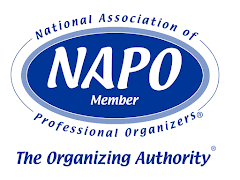Karin E. Fried of Organizational
Consulting Services Earns a Level II: Hoarding Specialist Certificate.
The Level II: Hoarding
Specialist Certificate presents some strategies, resources and collaboration
techniques for professional organizers working with these clients.
October 10, 2017 – Karin E. Fried of
Organizational Consulting Services has earned her advanced Level II: Hoarding
Specialist Certificate from the Institute for Challenging Disorganization
(ICD). The purpose of ICD’s study series is to provide both basic and
specialized topic education on issues, concepts, and challenges presented by
client work with the chronically disorganized.
The Institute for Challenging
Disorganization (ICD) promotes continued learning in this highly specialized
field. ICD’s mission is to provide education, research and strategies to
benefit people challenged by chronic disorganization. ICD explores, develops
and communicates information, organizing techniques and solutions to
professional organizers, related professionals and the public.
This
certificate focus on the advanced study of hoarding issues. To earn this
certificate, Fried was required to attend numerous courses that explore topics
such as “How to Effectively Work with a Hoarder and their Family”, “Advanced
Hoarding”, “Hoarding Disorder: Comorbidities and Complexities”, “Understanding
& Overcoming Triggers for Excessive Acquiring & Saving”, “Uncovering the Elephant in the Room: The Impact of Hoarding
in Families”, “Treatment for People with Hoarding Disorder”, “Helping the
Families of Treatment Refusing Hoarders” and more. Fried also had to study
numerous books such as “Overcoming Compulsive Hoarding”, “Buried in Treasures:
Help for Compulsive Acquiring, Saving, and Hoarding”, “Digging Out: Helping
Your Loved One Manage Clutter, Hoarding, and Compulsive Acquiring”, “Life in
rewind: The Story of a Young Courageous Man Who Persevered Over OCD and the
Harvard Doctor Who Broke the Rules to Help Him” and other books by the leading
experts in the field of Hoarding and OCD.
Prior to
completing this coursework, Fried has also earned her Level II Chronic
Disorganization (CD) Specialist Certificate, a Certificate of Study in Chronic
Disorganization, a Certificate in Basic Hoarding Issues with the CD Client, a
Certificate of Study in Understanding the Needs of the Elderly CD Client, a
Certificate of Study in Basic ADD Issues with the CD Client, a Certificate of
Study in CD Client Administration, a Certificate of Study in Life Transitions,
a Certificate of Study in Interpersonal Intelligence, a Certificate of Study in
Time Management and Productivity, and a Certificate of Study in
Mental Health Conditions and Challenges Affecting the CD Client.
The Specialist Certificate provides
in-depth information on hoarding and how to help clients manage more
effectively in relation to stopping the acquiring and saving and staying
organized.
“My ongoing education allows me to
work with clients who are challenged by hoarding in a very specific manner”
said Fried. Increasing my knowledge will enable me to provide the highest
quality individualized services to my clients”.
Organizational Consulting Services
provides both business and residential organizing services. As a Professional
Organizer and Productivity Consultant, Fried works with a variety of clientele,
from people who need just basic organizing help, people with chronic
disorganization and hoarding issues, people with all types of issues such as TBI’s,
Asperger’s, ADD; clients that need help with paper and time management, clients
that need help with estate or life management and anything in between. Fried
also provides virtual organizing to clients all over the world.



